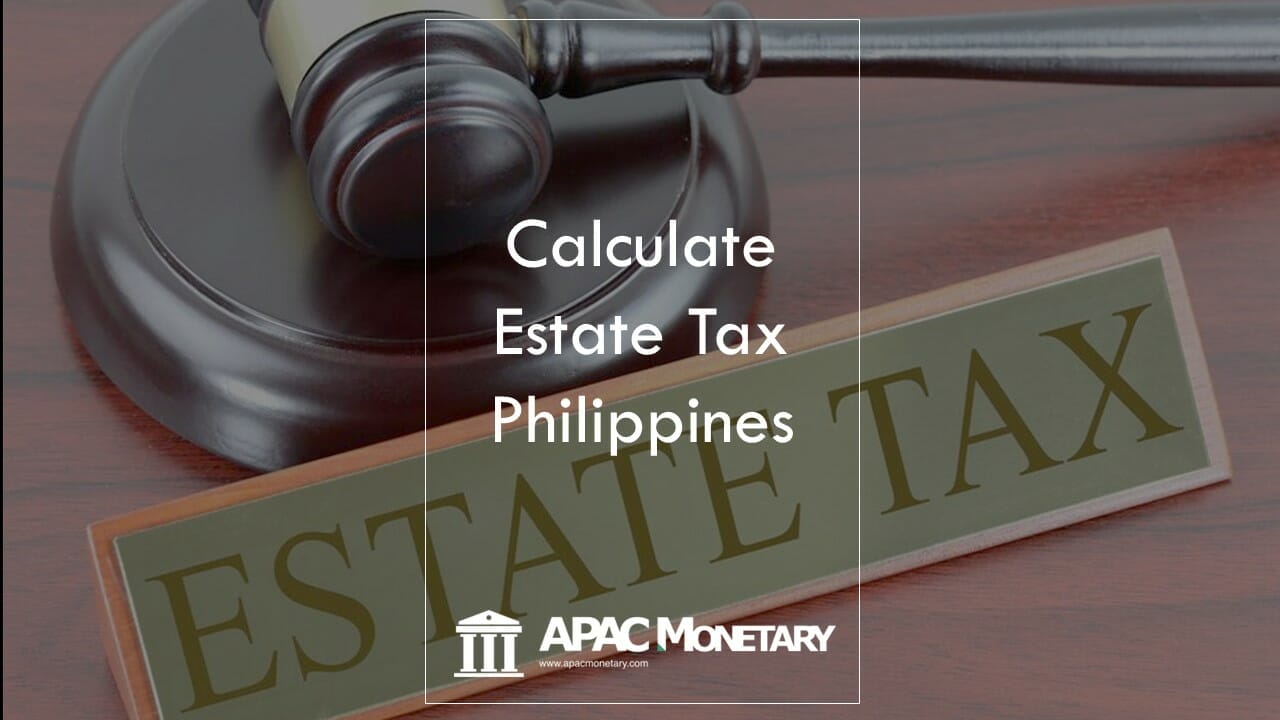Table of Contents
Are you required to pay estate tax in the Philippines? If so, how do you compute it? This guide will show you how to compute estate tax in the Philippines.
An estate tax (also known as inheritance tax) is a tax required for the transfer of properties and assets from a deceased person to their lawful heirs and beneficiaries in the Philippines. This type of tax must be paid before any distribution to heirs and beneficiaries is made. While it is the deceased person’s job to pay this tax, obviously, they can’t, so the people left behind, particularly the heirs, executors, or administrators, will be the ones to file the estate tax return.

Estate tax basics: What is an estate tax?
An estate tax is a tax that is imposed on the transfer of property at the time of an individual’s death. The tax is imposed on the value of the property, less any debts and expenses. The estate tax is calculated by using a graduated rate schedule.
To calculate the estate tax, you must first determine the value of the property.

Who pays estate tax?
Estate tax in the Philippines is imposed on the net estate of the decedent. The net estate is composed of all the property, real and personal, tangible and intangible, wherever situated of the decedent at the time of his death, less all debts and charges against it.
The tax is payable by the executor or administrator before any distribution is made to the heirs. In case there is no executor or administrator appointed, or if the executor or administrator fails to pay the tax when due, each heir who received any property from the estate shall be jointly and severally liable for payment of the tax.

Why do we pay estate tax?
Estate tax is a tax that is levied on the property of a deceased person. The tax is based on the value of the property, and it is payable by the heir or beneficiaries of the estate. The estate tax is used to fund the government’s expenses, and it is also used to fund public services such as education and infrastructure.
The estate tax is important because it helps to ensure that the government has enough money to provide basic services to its citizens. It also helps to prevent wealthy individuals from passing their wealth on to their children without paying any taxes. Without the estate tax, there would be a large disparity between the rich and the poor.
The estate tax is also important because it encourages people to spend their money during their lifetime instead of hoarding it.

How to compute estate tax in the Philippines? How is estate tax calculated?
In order to know how much estate tax is needed to be paid, a simple computation needs to be done. If you came here to find out how to compute estate tax Philippines, then you’re in the right place! This article will provide you with the steps, so read on!
How to Compute Estate Tax in the Philippines?
Prior to computing the estate tax, everyone must first learn the difference between gross estate and net estate. So, here’s a brief definition of the two:
Gross Estate
The gross estate pertains to the whole value of the properties and assets of a deceased person before the taxes and liabilities get subtracted. The estate comprises the following assets whatever their locations are: real properties, tangible personal properties, and intangible personal properties.

Net Estate
The net estate is simply the amount that’s left after deductions are made. The figure subtracted typically includes the standard deduction in the amount of 5 million pesos; claims against the estate, like casualty losses, debts, taxes, and unpaid mortgages; and the family house, which is parallel to its present-day fair market value.
Here’s How to Compute Estate Tax in the Philippines
Now that you know what gross estate and net estate are, let’s now proceed to the computation of the estate tax. Take note that the estate tax is 6% of the net estate.
First, you must first determine the gross estate of the deceased person, then subtract the liabilities from it. The amount left is your net pay, then multiply it by 0.06 (6%). The answer will be your estate tax.
For instance, the gross estate is 5 million pesos, and the deductions are 1 million pesos. Subtract 1 million from 5 million, and you’ll get 4 million (which is the net pay). Then, multiply 4 million by 0.06 (6%), and the product is 240,000, which is the estate tax.

What is the rate of the estate tax in the Philippines?
In the Philippines, the estate tax is imposed on the net estate of the decedent.
According to the Bureau of Internal Revenue (BIR), the rate of the tax is six percent (6%).
Here is the formula for how to compute estate tax in the Philippines.
| Over | But not Over | Your Tax Will Be | Plus | Of the Excess Over |
| P 200,000.00 | Exempt | |||
| P 200,000.00 | 500,000.00 | 0 | 5% | P 200,000.00 |
| 500,000.00 | 2,000,000.00 | P 15,000.00 | 8% | 500,000.00 |
| 2,000,000.00 | 5,000,000.00 | 135,000.00 | 11% | 2,000,000.00 |
| 5,000,000.00 | 10,000,000.00 | 465,000.00 | 15% | 5,000,000.00 |
| 10,000,000.00 | 1,215,000.00 | 20% | 10,000,000.00 |
The computations for an estate tax return begin with determining the gross estate, which includes all properties, whether real or personal, tangible or intangible, wherever situated of a decedent at the time of his death. The said properties may be in possession of the decedent himself/herself or by any other person/s. Intestate succession takes place when a person dies without leaving a will.

Where do you pay estate tax?
The estate tax is payable to the Commissioner of Internal Revenue and must be paid within thirty (30) days from the filing of the return.
The estate tax in the Philippines is computed based on the fair market value of the decedent’s estate, less allowable deductions. The tax is imposed on the net estate, which is the difference between the fair market value of the assets and liabilities.
The estate tax return must be filed within six (6) months from the date of death and must be accompanied by a certification from the Bureau of Internal Revenue that all taxes due from the decedent have been paid.
Before paying your estate tax, ensure that you know how to compute estate tax in the Philippines.

What are the documentary requirements when filing an estate tax?
According to the Bureau of Internal Revenue, here are the requirements.
1. 1 original copy and two 2 photocopies of the death certificate that has been certified as a true copy.
2. TIN number of the deceased and any heirs; 1 original copy is only for presentation). Here’s how you can get the TIN number.
3. Any of the following: (2 photocopies and 1 original copy)
a) Self-Adjudication Affidavit;
b) The Deed of Extra-Judicial Settlement of the Estate, in the event that the estate has been arbitrarily resolved; c) If resolved judicially, a court order; d) A sworn declaration of all estate assets;

- A certified copy of the schedule of partition and the order of the court approving the same within thirty days after the promulgation of such order, in case of judicial settlement. (2 photocopies and 1 original)
- Evidence of claimed tax credit, if any; (2 photocopies and 1 original)
- For a decedent who passed away on or after January 1, 2018, a CPA statement on the decedent’s itemized assets, itemized deductions from the gross estate, and the amount due if the gross estate value exceeds five million pesos (PHP 5,000,000) or two million pesos (PHP 2,000,000) for a decedent who passed away between January 1, 1998, and December 31, 2017, is required. (2 photocopies and 1 original)
- Promissory Note which should be properly notarized for “Claims Against the Estate” resulting from Loan Agreement; (2 photocopies and 1 original)
- A breakdown of the loan proceeds obtained within three years of the decedent’s death; (2 photocopies and 1 original)
- Evidence supporting the alleged “Property Previously Taxed” (2 photocopies and 1 original)
- Evidence supporting the alleged “Transfer for Public Use”; (2 photocopies and 1 original)
- If applicable, a copy of the Tax Debit Memo is used as payment. (2 photocopies and 1 original)

Real estate requirements:
- If applicable, certified authentic copies of the front and back pages of the real estate transfer/original/condominium certificates of title; (2 photocopies and 1 original)
- If appropriate, a certified genuine copy of the real property tax declaration from the time of death; (2 photocopies and 1 original)
- When declared properties have no improvements, the Assessor’s Office issues a Certificate of No Improvement. (2 photocopies and 1 original)
For individual property:
- If appropriate, a certificate of deposit, investment, or debt that belonged to the deceased and the surviving spouse; (2 photocopies and 1 original)
- A photocopy of the vehicle’s certificate of registration and, if necessary, other documentation demonstrating the vehicle’s exact market worth; (2 photocopies and 1 original)
- Evidence of the value of stock shares at the time of death, if applicable: (2 photocopies and 1 original)
- The most recent audited financial statement of the issuing company, along with a calculation of the book value per share, for shares of stocks that are neither listed or traded;
- Price index from the PSE/latest FMV reported in the press at the time of the transaction for shares of equities listed or traded;
- Price listed in newspapers on the transaction date or the day closest to it for club shares.
- A photocopy of the stock certificate, if applicable; (2 photocopies and 1 original)
- If necessary, evidence of the value of any other forms of personal property. (2 photocopies and 1 original)

If applicable, any further requirements:
- One (1) original copy and two (2) photocopies of the Special Power of Attorney (SPA), if one of the heirs is named as the executor or administrator and the party handling the transfer is not a party to the transaction.
- A certification from the Philippine Consulate or, if conducted overseas, the Hague Apostille Convention; (2 photocopies and 1 original)
- If the zonal value cannot be easily ascertained from the given papers, a location plan or viciniity map must be submitted; (2 photocopies and 1 original)
- If you are tax exempt, the Commissioner of Internal Revenue or his authorized representative will issue you a certificate of exemption or BIR ruling (2 photocopies and 1 original)
- Estate tax due: request for installment payment authorized by BIR; (2 photocopies and 1 original)
- Request for a Partial Estate Disposition, BIR-approved; (2 photocopies and 1 original)
- Aside from what may be needed by law, rules, regulations, etc. (2 photocopies and 1 original)
Before submitting your requirement, ensure that you know how to compute estate tax in the Philippines.

What can you do to minimize estate tax?
There are a few things that can be done in order to minimize the amount of estate tax that is owed.
First, it is important to keep good records and to have a clear understanding of the value of the assets within the estate.
Secondly, gifts can be given to family members or other individuals during one’s lifetime, which can help to reduce the size of the estate and, as a result, the amount of tax that is owed.
Finally, it may be possible to set up trusts which can also help to minimize the taxes owed on an estate.

Exclusions from estate tax in the Philippines
There are certain types of property that may be excluded from the value of your estate.
If your net estate is PHP 0 to PHP 199,999, you are exempted.
Credits against estate tax in the Philippines
You may be able to reduce your estate tax liability by claiming certain credits.
The estate tax in the Philippines is computed by taking into account the value of all the decedent’s property at the time of death, less any debts and expenses. The first step is to determine the gross estate, which includes all real and personal property, whether located in the Philippines or not. Then, allowable deductions are subtracted from the gross estate to arrive at the taxable estate.
Credits against estate tax are available for any taxes paid on property transferred during the decedent’s lifetime, as well as any foreign estate taxes paid on property located outside of the Philippines.

Filing an estate tax return in the Philippines
Filing an estate tax return is a necessary step in the process of administering a deceased person’s estate. The return must be filed within six months from the decedent’s date of death and must be accompanied by a certified true copy of the death certificate.
Estate tax returns are filed with the Bureau of Internal Revenue (BIR) and are subject to taxes, depending on the relationship of the heir to the decedent.
The gross estate includes all property owned by the decedent at the time of death, regardless of whether it is located in the Philippines or abroad. Property that is subject to estate tax includes real property, personal property, stocks and bonds, insurance policies, and bank accounts.
You must file an estate tax return if the value of your estate is more than the filing threshold.
Before filing an estate tax return, ensure that you know how to compute estate tax in the Philippines.

Conclusion: How to Compute Estate Tax in the Philippines
In conclusion, computing your estate tax in the Philippines is a relatively simple process. By following the steps outlined in this article, you can be sure that you are correctly computing your taxes owed. With the proper planning, you can minimize the amount of taxes you owe on your estate.






